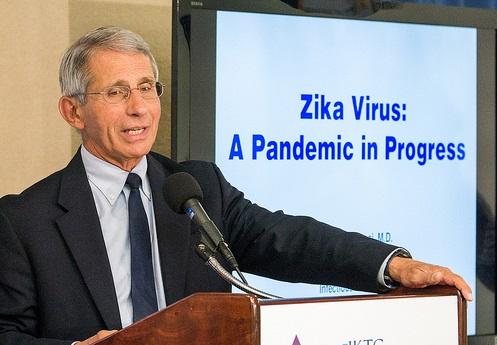Top federal health officials are sounding alarms over almost-depleted funds for battling Zika virus, as mosquito control officials in Miami Beach, one of two of Miami-Dade county's active transmission areas, completed the first round of aerial spraying with naled.
In other developments, the number of local cases in Florida held steady for the third day in a row, and officials note the first known sexual transmission cases in Pennsylvania and the Netherlands.
Feds say Zika funds depleted
Anthony Fauci, MD, director of the National Institute of Allergy and Infectious Diseases (NIAID), told NBC News that the agency, which is spearheading work on candidate vaccines against Zika, has run out of money for its work on the virus. "I have no more money left for fiscal year 2016 that ends on Sep 30," he said.
Meanwhile, CDC Director Tom Frieden, MD, MPH, told the Associated Press (AP), "We are now essentially out of money." Without a federal funding package specifically targeted to the disease, the CDC and the Department of Health and Human Services (HHS) has been drawing from $589 million in repurposed Ebola money to combat Zika.
On Twitter today, Frieden said, "We've now waited longer for Zika funding than we did for the Ebola and H1N1 outbreaks. Funding urgently needed."
The HHS Biomedical Advanced Research and Development Authority, the arm of government that supports the development of countermeasures against emerging health threats, has also nearly depleted its funds, according to the NBC News report.
Three days ago a $1.1 billion Zika funding bill failed again in the Senate due to controversial attached provisions. Talks of possible removing or postponing some of the problematic provisions are reportedly under way among Senators behind the scenes, but there are apparently no talks among House members to streamline the bill. Congress breaks again at the end of September and won't return to Washington until after the election.
Miami Beach spraying
Despite community protests that delayed the action by a day, aerial spraying near the affected area of Miami Beach took place early this morning, CNN reported.
State health officials have said naled aerial spraying, which targets adult mosquitoes, helped reduce mosquito populations in Miami's Wynwood neighborhood, which was the first to report active transmission. Follow-up spraying is scheduled for Sep 11 and the next two weekends.
In a related development, Florida today announced that more Zika-positive mosquitoes have been detected from the same area of Miami Beach where the earlier positive samples were found. The Florida Department of Agriculture and Consumer Services (FDACS) said all samples are Aedes aegypti and are from the areas of enhanced trapping and mosquito control.
Carlos Gimenez, Miami-Dade County mayor, said in the statement, "The fact that we have identified a fourth Zika-positive mosquito pool in Miami Beach serves as further confirmation that we must continue our proactive and aggressive approach to controlling the mosquito population, including our recent decision to begin aerial spraying in combination with larvicide treatment by truck."
The Florida Department of Health (Florida Health) reported no new locally acquired cases today for the third day in a row, keeping the state's total at 56.
Sexual transmission in Pennsylvania, the Netherlands
Meanwhile, the Pennsylvania Department of Health (PDH) today reported the state's first sexually transmitted Zika case. In a statement it said a Pennsylvania resident contracted Zika from a mosquito bite during travel to Zika-transmission area. The PDH added that upon returning to the United States the individual passed the virus to his or her partner.
The health department warned travelers to Zika-hit areas to take precautions to avoid sexual spread and for others to take steps to avoid mosquito bites. It said Ae aegypti haven't been found in the state since 2002, but Ae albopictus, which can also carry the virus, are present throughout major metropolitan areas of southern Pennsylvania.
The CDC said in an update yesterday that 24 sexually transmitted Zika cases have been reported in US states.
Elsewhere, the Netherlands has reported its first sexually transmitted Zika case, the World Health Organization (WHO) said yesterday in its weekly situation report. So far, 12 countries have reported person-to-person Zika spread, the agency said.
WHO, PAHO updates
In its weekly Zika report the WHO also said no new countries have reported their first mosquito-borne Zika transmission. It added, however, that the recent identification of a new local case in Malaysia moved the country from the list of countries that have ended Zika outbreaks to the list of countries with local transmission.
Weighing in on Singapore's recent surge in Zika cases, the WHO said previous circulation in Southeast Asia would likely afford some population immunity, which could temper the outbreak. The agency added, though, that it's not clear what's driving the sudden increase in cases.
Genetic analysis has shown the Singapore outbreak is fueled by a Zika strain similar to one that has been circulating in Southeast Asia since the 1960s. The WHO said, as in Guinea-Bissau, which has seen a spurt of infections from the African Zika strain, it's too soon to rule out the possibility of microcephaly and other neurologic complications. More work is needed to clarify any possible relationship.
Meanwhile, the Pan American Health Organization (PAHO) said yesterday in its regular update that most countries and regions are showing a declining Zika trend, including the Caribbean area that includes Puerto Rico. It warned, however, that close monitoring is needed to see if dropping levels there continue.
A few areas are reporting increasing Zika activity, including the United States, where the disease is spreading in south Florida. Costa Rica and Guatemala have also noted increased activity.
See also:
Sep 8 NBC News report
Sep 9 AP story
Tom Frieden Twitter feed
Sep 9 CNN report
Sep 9 FDACS statement
Sep 9 Florida Health daily Zika update
Sep 9 PDH statement
Sep 8 WHO weekly Zika situation report
Sep 8 PAHO Zika update





















